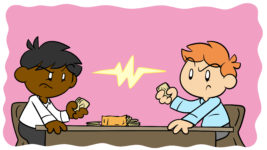Long before George Orwell’s name became synonymous with his terrifying 1948 novel 1984 and his children’s book about Stalinism, Animal Farm, he was known for his political and moral non-fiction. A staunch socialist, Orwell’s ever-present political preoccupations and his utilitarianism are reflected in his spartan, concise, and lucid prose style. Keenly aware of language and of the political and social systems working behind it, Orwell contributed many new words and phrases to the English language, the best-known of which are ‘Big Brother’, ‘thoughtcrime’, ‘thought police’, ‘doublethink’, and ‘Room 101’.
Now considered one of the defining figures of twentieth-century literature, Orwell has much to teach writers willing to learn. Thankfully, he was very vocal about his style, and never shied from giving advice and from discussing the dangers of imprecise and pregnant language. Language, after all, is what we use to formulate our thoughts, and Orwell worried that the corruption of language led to the corruption of thought, which in turn allowed for the justification of atrocities and the dressing-up of crimes.
So, let’s follow the road to Wigan Pier and see what all the fuss is about.
1. Avoid dead metaphors
‘Avoid cliché’ is such a frequently given piece of writing advice that it has itself become clichéd, but before you roll your eyes, know that Orwell at least explains himself. Orwell’s warning here is linked specifically to language, and addresses the thoughtless reproduction of pretty metaphors, similes, and idioms. Take, for example, ‘toe the line’, (which, Orwell bemoans, is often mangled and reproduced as ‘tow the line’) ‘swan song’, ‘on the other hand’, ‘play into the hands of’, etc. sounds nice and can be easily and thoughtlessly put to work, but they shouldn’t be; think about what you’re writing, consider what words you’re using and why, research the social/political contexts behind the language you’re using, and pinpoint the images/emotions you want to conjure or elicit.
Clichéd phrases push out more creative, emotive expression without paying their way.Click To TweetTired or clichéd phrases have long ago been drained of any power; they’re so commonplace that they barely elicit a response. Avoiding such traps is more difficult than you might think! Orwell explains:
This invasion of one’s mind by ready-made phrases (lay the foundations, achieve a radical transformation) can only be prevented if one is constantly on guard against them, and every such phrase anaesthetizes a portion of one’s brain.
– George Orwell, ‘Politics and the English Language’
2. Avoid pretentiousness
Spartan through and through, Orwell had a real no-nonsense approach to storytelling and journalism. He dismissed the overblown, needlessly complex, Latinate prose of academics, politicians, and ‘bad writers’, going so far as to declare:
Bad writers, and especially scientific, political, and sociological writers, are nearly always haunted by the notion that Latin or Greek words are grander than Saxon ones, and unnecessary words like expedite, ameliorate, predict, extraneous, deracinated, clandestine, subaqueous, and hundreds of others constantly gain ground from their Anglo-Saxon numbers.
– George Orwell, ‘Politics and the English Language’
Orwell was conscious that words can be used in insidious and nefarious ways. Simple statements can be dressed up and biased statements can easily be given airs of scientific impartiality. Use of Latin or French terms in English prose can similarly be used to grant an air of elegance or culture to bland statements or ugly ideas, and the insertion of vague, long, barely related words can be used to obscure meaning while making the writer seem intelligent. All such methods are forms of deception – you’re lying to your reader rather than letting your meaning stand unambiguously. As Orwell wrote, ‘The great enemy of clear language is insincerity.’
Insincerity leads to a lack of clarity. If you suspect the latter, investigate the former.Click To TweetThis attack on pretentiousness finds itself reflected in two of Orwell’s best-known pieces of writing advice: ‘Never use a long word where a short one will do’ and ‘ Never use a foreign phrase, a scientific word, or a jargon word if you can think of an everyday English equivalent’. These are built on the same foundational reasons; in your writing, you should be trying to communicate an understandable message, not a deceptively flattering image of yourself. Be clear, not obscure or esoteric, and forget your ego.
3. Be concise
‘It’s a beautiful thing, the destruction of words.’ So says Syme in 1984, and while he and Orwell don’t exactly see eye to eye, they do at least agree on the benefits of concise expression. Like his American peer Ernest Hemingway, Orwell was not a fan of overblown, maximalist narration. This shouldn’t come as a surprise; we’ve already seen that Orwell wasn’t into adorned or flowery prose, and it makes sense that he’d value the other side of that coin.
In non-fiction, conciseness is important so that the writer can communicate his point clearly, plainly, and fairly – a brief, to-the-point style means that arguments and assertions won’t be weighed down or elevated by deceptive stylistic pretensions. In fiction, conciseness leaves space for reader interpretation and allows for context to flex its muscles.
Keep your writing concise and you allow every reader the room to perfect their version.Click To TweetLike so much of Orwell’s writing philosophy, his championing of conciseness shows his respect for the reader; he trusts them to read between the lines, recognize contextual cues, and form their own interpretations of events. In Orwell’s fiction, every sentence, every word, is doing something. Literature should be concentrated and rich; therefore, ‘If it is possible to cut a word out, always cut it out.’
4. Be immediate
Perhaps due to his always-political subjects, Orwell’s writing is always urgent, immediate, and active. He demands his readers’ attention now, not later – fascism needs dealing with now, Stalinism needs attention this minute, the thought police are going to kick your door down any second now. This is a remarkable feat of writing, and Orwell achieves it in his non-fiction by writing in the first person about his own lived experiences and in his fiction by always sticking to the active voice, never the passive.
In case you don’t know, in a sentence written in the active voice, the subject of the sentence performs the action; for example, in the sentence ‘Winston loved Big Brother’, the subject (‘Winston’) performs the act of loving Big Brother. In sentences written in the passive voice, the subject of the sentence receives the action; for example, ‘Big Brother was loved by Winston.’ In this example, ‘Big Brother’ is the subject.
The active voice is, as its name suggests, active, urgent, and exciting. It draws the reader into the present moment of the text. The passive voice meanwhile has the opposite effect; it slows the sentence’s pace, places focus on the act rather than on the actor, and shifts the action back in time. The passive voice also involves more words and, as we know, Orwell wants us to be concise!
5. ‘Break any of these rules sooner than say anything outright barbarous’
An extremely important and self-explanatory pointer, this last exhortation to break the rules rather than write anything overtly offensive or barbarous is one to tattoo across your chest. It should especially be kept in mind when writing non-fiction (for what’s fiction without a little barbarity?)
Even beyond that, Orwell’s qualifier makes it clear that even his ‘rules’ are bendable to the needs of the writer and readership, and that there’s a hierarchy of communication at work in which all sins are not equal.
What value trumps all others in your writing? Kindness? Truth? Clarity? Curiosity?Click To TweetOrwell that ends well
By keeping Orwell’s warnings about the power and context of language in mind, you’re sure to produce prose that’s thoughtful, aware, and clear. Remember that the most important thing we’re trying to do as writers is communicate; everything else is secondary.
By sticking to these rules (or breaking them for the right reasons), you’ll do your part to render thoughtcrime literally impossible. Good work, prole.
What are your favorite works by George Orwell? What lessons have you gleaned from his writing? Let me know in the comments, and check out 5 Ways Ernest Hemingway Can Help You Improve Your Writing and 7 Ways William Faulkner Can Help You Improve Your Writing.






2 thoughts on “5 Ways George Orwell Can Help You Improve Your Writing”
Oh yes, I love George Orwell and I was really excited when I saw this! Great advice from one of the greatest dystopian writers of all time. 1984 will always be my personal favorite, although his non-fiction essays and Animal Farm are excellent as well. I’m liking these articles that are themed with great authors. Great work!
Hi Juliette,
I agree wholeheartedly! George Orwell has a lot to teach us, and his works seem to get more relevant every day. I’m glad you enjoyed the post, and thanks for your comment!
Best,
Fred